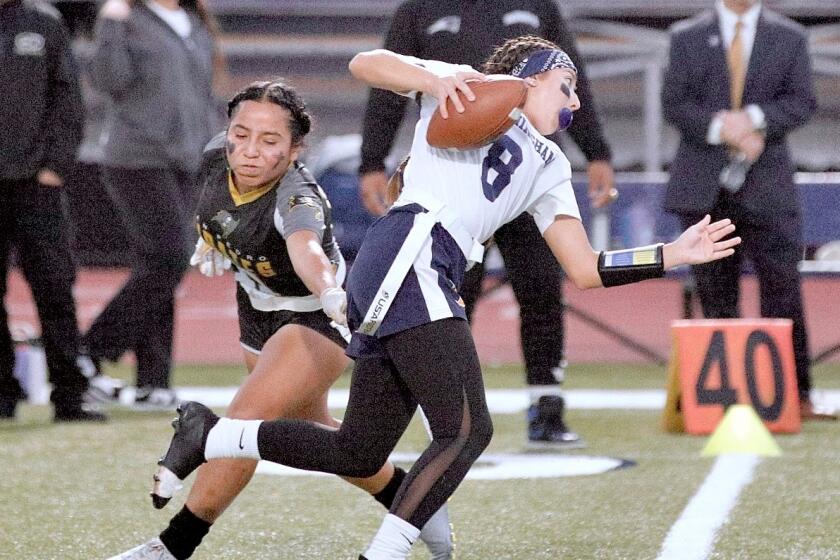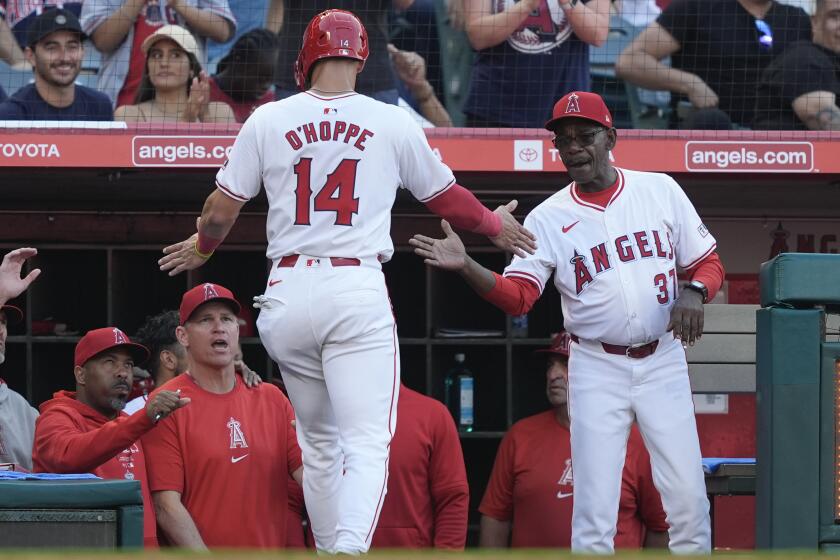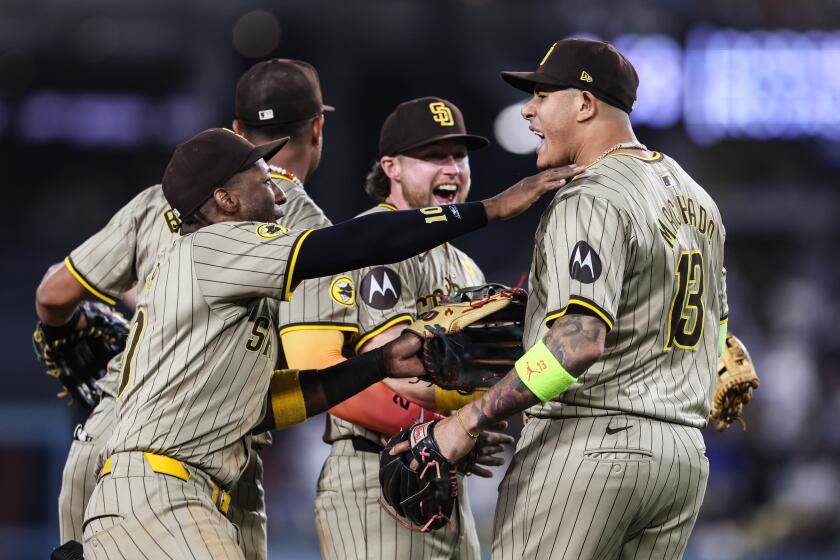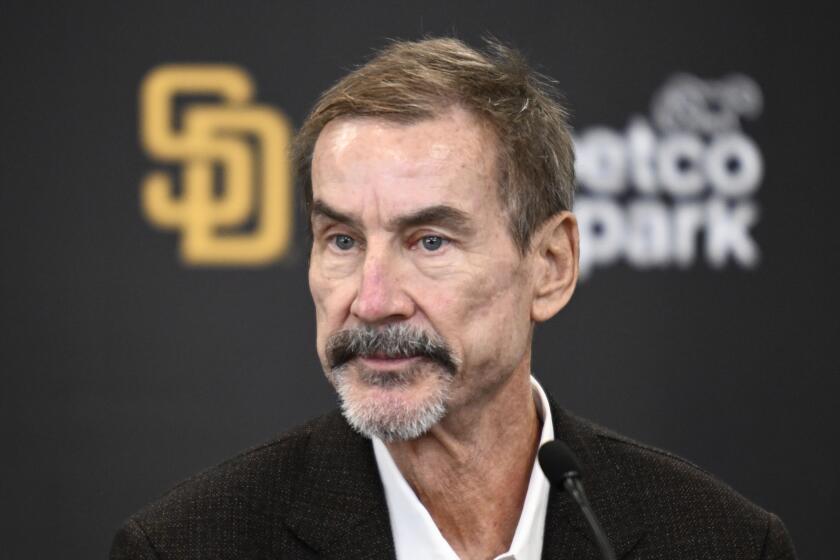Alex Johnson, Angels’ sole batting champ, and his enigmatic ways
The silver bat accompanies Alex Johnson outside his Detroit residence on occasion.
Once he toted it to his chiropractor, removing it from wrapping that had concealed its identity.
“I said, ‘Do you know what this is?’” the former Angels left fielder recalled in a telephone interview recently. “He looked at it and was astounded.”
Johnson, 69, has a history of surprising people — for better or worse.
In 1970, he hit .3289 to edge Carl Yastrzemski by .0003 and win the Angels’ first and only American League batting championship. By the middle of the next summer, he had been fined, benched and suspended by the Angels for lack of hustle and a poor attitude.
He would never play another game for the franchise that he left befuddled.
“Sometimes you’d watch him and laugh,” said Jay Johnstone, who played center field for the Angels in 1970, “and sometimes you’d watch him and you’d be amazed.”
Johnson’s career unraveled so long ago that it has been either forgotten or was never known by generations of Angels fans.
His exploits could be widely revisited in the coming months should rookie center fielder Mike Trout win the Angels’ second batting title in their 52 seasons. Trout’s .350 average going into Monday’s game put him comfortably ahead of his nearest competitor, the Chicago White Sox’s Paul Konerko, who was hitting .330.
The Angels have not trumpeted Johnson’s achievement through the years, largely thanks to his acrimonious departure from the team.
And Johnson has not kept close tabs on the Angels, the notion never occurring to him that he might be the franchise’s only player to win a batting title and be awarded a silver bat.
“I thought Rod Carew or one of those guys did it,” Johnson said. “I really haven’t been paying attention to it.”
Johnson has taken notice of the speedy Trout, particularly when the Angels played Johnson’s beloved Detroit Tigers this month at Comerica Park.
“He can run; he’s got a lot of talent,” Johnson said.
The same could be said of Johnson, who was known to wear industrial-strength gloves and take batting practice from 40 feet instead of the usual 60 to enhance his bat speed.
But those who have observed Johnson and Trout say there are few similarities between the muscular batting champion and the 20-year-old who is already being hailed as one of the best in the game.
Yes, they are both fast. Sure, they can both make spectacular catches.
It’s just that Johnson’s feats came with an asterisk.
“When he wanted to,” Johnstone said, “he could fly.”
That desire seemed to lessen within Johnson each year in the latter portion of his career.
When he was traded to the Angels before the 1970 season, he was still beating out routine grounders and making diving catches in the gap.
He was hitting .346 in late June when Carew, the Minnesota infielder who was leading the league with a .366 average, sustained torn knee ligaments that ended his season.
Johnson went into the final game of the season needing two hits in three at-bats to pass Yastrzemski, the Boston slugger who had posted a .3286 average.
Batting leadoff, Johnson grounded out in his first at-bat. But he singled to right field his next time up and, in his third at-bat, hit a ball down the third base line.
Johnstone said that Chicago White Sox third baseman Bill Melton, who backhanded the ball, would later tell him that by the time he pivoted and cocked his arm to throw, Johnson had already blazed past first base.
The Anaheim Stadium crowd erupted.
“I looked up on the scoreboard and saw my name ahead of Carl Yastrzemski’s,” remembered Johnson, who was immediately removed from the game.
Johnson didn’t stick around long to celebrate, the Angels having been eliminated from playoff contention in previous weeks.
“I had my car packed, my wife and baby in the car, and headed back to Detroit that night,” he said.
Some Angels executives probably wished he never came back.
His run-ins with team management started in earnest the next spring, when he stood in the shadow of a light structure during an exhibition game. He followed the shadow as it moved across the outfield on the sweltering day, disregarding standard defensive positioning.
Johnson was also known to exhibit indifference while chasing fly balls and to take only a few steps toward first base before heading for the dugout on balls he hit that he assumed would be outs. He was fined $3,750 that season and benched five times for lack of hustle.
“If you covered the team on a daily basis, you eventually saw it,” said Ross Newhan, the Hall of Fame baseball writer who covered the Angels for The Times. “There were times when he simply wouldn’t run hard.”
Johnson also had several dust-ups with teammates. Pitcher Clyde Wright threatened him with a stool, and infielder Chico Ruiz, a former close friend, allegedly pulled a gun on him in the clubhouse.
Enough was enough. And then some.
The late Dick Walsh, then the Angels’ general manager, unsuccessfully tried to trade Johnson before suspending him in June 1971 and ultimately being forced by Major League Baseball to reinstate him two months later after a grievance hearing in which Johnson was found to suffer from emotional distress.
Johnson left the franchise shortly thereafter, spending his final five seasons with four other teams.
He never hit higher than .287 and retired in 1976.
Johnson said he lost his desire to play baseball as the result of his two seasons with the Angels.
“I basically don’t know what kind of hitter I could have been,” said the player who finished his 13-year career with a .288 average, “because I never had a chance to explore my talent because of all the trouble I got into.”
Asked whether he always exerted full effort, Johnson would not question himself. He said his only regret was that the Angels didn’t win more games during the summers of his discontent.
Slowed in recent years by a slew of ailments that have included a broken wrist, carpal tunnel syndrome and a herniated disk in his back, Johnson said he did not know whether he would return to Angel Stadium should the Angels decide to honor their only batting champion.
The Angels have no plans to do so.
In eight years, it could be a not-so-golden anniversary for that silver bat.
More to Read
Go beyond the scoreboard
Get the latest on L.A.'s teams in the daily Sports Report newsletter.
You may occasionally receive promotional content from the Los Angeles Times.











